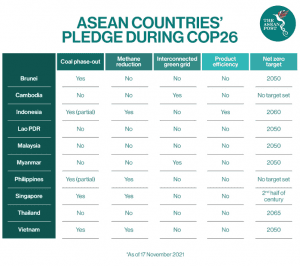After being delayed for a year due to the Covid-19 pandemic, the UNFCCC finally hosted its biggest climate conference, the UN Climate Change Conference of the Parties (COP26) from October 31 to November 13, 2021. The goal of COP 26 is to set greenhouse gas (GHG) emission reduction targets and strengthen national resilience frameworks against the climate crisis. Southeast Asia is one of the most vulnerable regions facing the consequences of climate change, and ASEAN, as one of the organizations that placed climate change as one of its main priorities, has welcomed the COP 26. For ASEAN Member States (AMS), COP26 is a stepping stone to enhance their climate promises under the Paris Agreement. The COP 26 also creates an opportunity for ASEAN to foster regional and global partnerships. Furthermore, ASEAN believes that the cooperation framework that is being offered by COP 26 could assist developing nations like AMS to overcome the “classical problem” from climate action. The existence of COP 26 is intended to encourage local capacity building, loosen investment, and facilitate the exchange of information and technology as key drivers for AMS to move toward low GHG emission and climate resiliency.
At COP 26, ASEAN demonstrated its strong commitment to supporting the development of a global climate agenda. ASEAN declared The ASEAN Joint Statements on Climate Change to the UNFCCC COP 26 and restated its shared commitment and collective effort in pursuing energy security and energy transition in the region. The regional achievement of a 21% reduction in energy intensity in the energy sector, exceeding its aspirational aim, and a 13.9 percent contribution of renewable energy in the energy mix by 2018 is also highlighted in this joint statement. The joint statement also outlines The 2016 ASEAN Plan of Action for Energy Cooperation (APAEC) 2025: Phase II (2021-2025) that provides updated regional targets for ASEAN’s energy transition to low GHG emissions (ASEAN, 2021). At the national level, as a signatory to the UNFCCC and the Paris Agreement, AMS has revised and submitted its Nationally Determined Contributions (NDCs) before COP26. The NCDs are designed based on the national circumstances of each country. Considerable improvements in GHG reduction objectives and mitigation goals, which are affirmed in numerical targets, unambiguous reference points, and political decision-making governance that is routed through a specialized working group, committee, or ministry could be seen from the NDCs that have been submitted by AMS. Through NDCs, AMS gave their overview of how far they have come in terms of climate change mitigation and adaptation and ensured that climate action progress is kept on track. (Merdekawati, et.al., 2021).
The NDCs and ASEAN joint statement certainly prove the region’s strong aspirations and commitment in achieving global climate goals, integrating themself into the global climate regimes, and enhancing regional initiatives under Brunei Darussalam’s leadership in 2021 that make climate change one of the main goals. However, it appears that the ASEAN decision-makers conveyed their contributions in a variety of ways at COP 26. Several ASEAN countries were conspicuously absent from a number of climate-related measures presented during COP26. Some of AMS, for example, are still hesitant to lend a hand in shifting away from an unabated coal power generation framework, particularly those who have been identified as large carbon emitters from their agricultural activities and energy usage. Several ASEAN countries, including Cambodia and the Philippines, have yet to demonstrate that they will meet their zero-emission targets (Safrina, 2021).

Table Source:https://aseanenergy.org/cop26-aseans-commitment-in-the-energy-sector-economy/
On the other hand, COP 26 underlines the climate change initiative based on the principle of equality and common but differentiated responsibilities and respective capabilities (CBDR-RC). This principle emphasizes that all countries share responsibility for global environmental degradation, but that responsibility is not shared equitably. This principle strikes a balance between the need for all countries to take responsibility for global environmental problems on the one hand, and the need to recognize the wide differences in terms of economic development among countries, which encourage differences in contributions and ability to cope with climate problems on the other. It seems that the CBDR-RC needs to be reconsidered since there are potential loopholes that might be used by AMS to evade responsibilities and suspend the regional efforts to mitigate climate change. ASEAN joint statement at COP26 may show AMS’ determination to go forward with regional collaboration and the COP26 may facilitate ASEAN to establish a long-term and more sustainable effort for climate cooperation in the future. However, ASEAN appears to be having various challenges in implementing its climate mitigation policies, especially in the form of the lack of unity of ASEAN countries in responding to climate change. ASEAN should be more focused on unifying climate action at the regional level and encouraging AMS to incorporate the COP 26 cooperation framework into their national policies.
About Writer
- Chusnul Mar’iyah was a Programme Division intern at ASEAN Studies Center Universitas Gadjah Mada. She is currently an Undergraduate Student majoring in International Relations at Universitas Gadjah Mada.
References:
- ASEAN. (2021). The ASEAN Joint Statements on Climate to the 26th Session of Conference of the Parties to the United Nations Framework Convention on Climate Change. ASEAN.org. https://asean.org/wp-content/uploads/2021/10/10.-ASEAN-Joint-Statement-to-COP26.pdf
- AWGCC. (2021). Can Southeast Asia : Statement to The ÀSEAN Working Group on Climate Change (AWGCC) by Civil Society in ASEAN Member States. Climatenetwork.org. https://climatenetwork.org/resource/can-southeast-asia-statement-to-the-asean-working-group-on-climate-change-awgcc-by-civil-society-constituencies-in-asean-member-states/
- Merdekawati M., Suryadi B., Suwanto, Lenanto G. (2021). ASEAN Climate Action: A Review of Nationally Determined Contribution Submissions towards COP26 (Policy brief 1-6). Retrieved from https://aseanenergy.org/asean-climate-action-a-review-of-nationally-determined-contribution-submissions-towards-cop26/
- Safrina, R. (2021). COP26: ASEAN’s Commitment in The Energy Sector Economy – ASEAN Centre for Energy. Retrieved 8 December 2021, from https://aseanenergy.org/cop26-aseans-commitment-in-the-energy-sector-economy/
